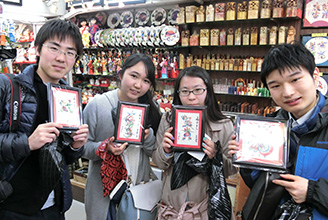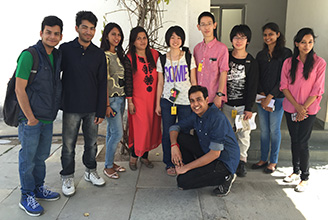Overseas program flow, application method, financial support
Cross-Cultural Tours

The program is short, lasting just three nights and four days, and is led by faculty and staff, so even first-time students can enjoy it with ease and peace of mind. The program aims to have participants visit local sites, as well as partner universities and interact with local students.
Overseas Business Tour

This tour allows participants to experience the overseas business scene and learn about "working overseas." The purpose is to get a real feel for working overseas and doing business overseas by visiting the overseas workplaces and hearing directly from businesspeople working there, and to think about their future careers. Participants can visit Japanese companies overseas and hear directly from businesspeople working there about the rewards and difficulties of doing business overseas, and what is necessary to work overseas.
Overseas language training

All undergraduate students can participate in overseas language training. It is a 2-3 week program in which students study English, Chinese, or Korean locally, improving their language skills and becoming familiar with the culture and life of the study location.
Exchange Programs

The CUC Summer Program is a similar program implemented at overseas universities that have participated in the CUC Summer Program. Students from our university are exempt from training fees and can basically participate with only travel and insurance fees (conditions vary by university).
The purpose of this program is to acquire intercultural understanding, communication skills, language skills, etc. through local cultural experiences, company visits, interactions with local students, etc. Student exchanges and various experiences abroad are a great opportunity to improve language skills and deepen understanding of different cultures, which are necessary in a global society.
Exchange Programs
As part of our international exchange program, we have established exchange student programs with seven universities in China, South Korea, Taiwan, and Germany.
By taking regular courses at overseas universities and studying with students from overseas, the aim is to gain a deeper understanding of knowledge from a different perspective than before, and to improve intercultural understanding and communication skills through interactions with local people. Students who meet the selection criteria set by each university are recommended as exchange students. In addition, credits earned at the host university can be approved after review by our university. Another attractive feature is that the period spent studying abroad is considered "on exchange," and is not treated as a leave of absence.